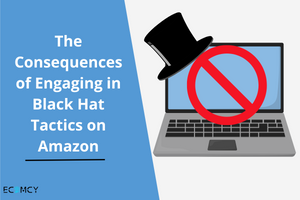The Consequences of Engaging in Black Hat Tactics on Amazon
March 13, 2024

Black hat tactics on Amazon refer to deceptive and unethical practices employed by some sellers to manipulate the platform's algorithms, policies, and competitive landscape for personal gain. These tactics often violate Amazon's terms of service and can range from artificially inflating product rankings to sabotaging competitors' listings.
Black hat tactics compromise the integrity of Amazon's platform, harm the shopping experience for customers, and can have severe consequences for sellers caught engaging in these practices.
The Dark Side of Amazon: Black Hat Tactics Unveiled
Fake Reviews and the Illusion of Trust
-
The power of reviews on Amazon: Reviews wield immense influence over consumer behavior on Amazon. They barometer a product's quality and reliability, guiding potential buyers' purchasing decisions. Positive reviews can bolster a product's reputation and significantly drive up sales, while negative reviews can deter customers and lead to decreased sales.
-
The prevalence of fake reviews and their impact on the marketplace: Despite Amazon's continuous efforts to combat fake reviews, they continue to plague the platform. Some sellers resort to purchasing fake reviews or offering incentives for positive feedback, creating a facade of credibility and trustworthiness around their products. This proliferation of counterfeit reviews undermines the integrity of Amazon's review system, distorting products' authentic quality and performance and eroding consumer trust.
-
Amazon's crackdown on fake reviews and the consequences for sellers: Amazon employs a multi-faceted approach to identify and remove fake reviews from its platform. Amazon actively seeks out and draws fraudulent reviews using sophisticated algorithms and manual review processes. Sellers caught manipulating reviews face severe penalties, including account suspension or banning from the platform. Amazon's stringent measures underscore its commitment to maintaining the integrity of its marketplace and preserving consumer trust.
Keyword Stuffing: Gaming the Algorithm at a Cost
-
Understanding Amazon's search algorithm: Amazon's search algorithm plays a pivotal role in determining the visibility and ranking of products in search results. Keywords serve as the cornerstone of this algorithm, with relevance, context, and quality being paramount factors in determining a product's search ranking.
-
The temptation of keyword stuffing and its repercussions: Faced with the allure of increased visibility and sales, sellers may succumb to the temptation of keyword stuffing—overloading their product listings with irrelevant or excessive keywords. However, this practice violates Amazon's policies and compromises the user experience by cluttering product listings with irrelevant information. Keyword stuffing ultimately undermines the effectiveness of Amazon's search algorithm and diminishes the quality of search results for consumers.
-
How keyword stuffing undermines user experience and violates Amazon's policies: Keyword stuffing detracts from the overall user experience by inundating product listings with irrelevant keywords and runs afoul of Amazon's policies against deceptive or misleading content. By artificially inflating keyword density, sellers distort the accuracy and relevance of their product listings, potentially misleading consumers and eroding trust in Amazon's marketplace.
Manipulating Sales Ranks: The Risks of Artificial Success
-
The importance of sales ranks on Amazon: Sales rank is a critical indicator of a product's popularity and performance relative to competitors. A higher sales rank translates to increased visibility and exposure in Amazon's search results, driving traffic and sales for a product.
-
The allure of manipulating sales ranks and its pitfalls: Sellers may be enticed by the prospect of achieving higher sales through artificial means, such as fake purchases or discounted giveaways. However, these tactics represent a short-sighted approach to success on Amazon, as Amazon's algorithms quickly detect them. Sellers risk incurring penalties such as demotion or removal from search results, ultimately undermining their long-term viability on the platform.
-
Detection methods employed by Amazon and the consequences for sellers: Amazon uses sophisticated techniques, including data analysis and user behavior monitoring, to detect abnormal sales activity and manipulation of sales ranks. Sellers caught engaging in such practices face severe repercussions, including damage to their reputation and loss of business. Amazon's vigilance underscores its commitment to maintaining a level playing field for sellers and preserving the integrity of its marketplace.
Sabotaging Competitors: A Desperate Gamble with Dire Consequences
-
The cutthroat nature of competition on Amazon: Competition among sellers on Amazon is fierce, with each vying for visibility and market share in crowded marketplaces. In such a competitive landscape, some sellers may use unethical tactics to gain a competitive edge.
-
Unethical tactics employed to undermine competitors: To gain a competitive advantage, some sellers may stoop to unethical tactics such as leaving fake negative reviews or reporting competitors for policy violations. These underhanded tactics not only tarnish the reputation of the sellers involved but also undermine the trust and credibility of Amazon's marketplace.
-
Legal and reputational risks associated with sabotaging competitors' listings: Sabotaging competitors violates Amazon's policies and exposes sellers to legal action for defamation or violation of intellectual property rights. Moreover, such tactics can damage a seller's reputation and erode customer trust. Ultimately, engaging in unethical practices to sabotage competitors represents a dangerous gamble with dire consequences for all parties involved.
Helpful Strategies for Steering Clear of Black Hat Tactics
Engaging in black hat techniques on Amazon may provide short-term gains, but the risks and consequences far outweigh any potential benefits. To build a sustainable and reputable business on the platform, avoiding unethical practices is crucial. Here are some valuable tips to avoid black hat techniques:
Prioritize Quality Over Quantity
Instead of resorting to fake reviews or artificially inflating sales, focus on delivering high-quality products and exceptional customer service. Positive reviews and organic growth will follow genuine customer satisfaction.
Follow Amazon's Policies
Get to know Amazon's Seller Code of Conduct and Policies. Adhering to these guidelines ensures that your business operates within the ethical boundaries set by the platform, reducing the risk of penalties or suspension.
Encourage Genuine Reviews
Rather than seeking fake reviews, encourage satisfied customers to leave genuine feedback. Implement post-purchase follow-up emails to request reviews, ensuring compliance with Amazon's guidelines.
Optimize Product Listings Ethically
Instead of keyword stuffing, optimize your product listings with relevant and accurate information. Use keywords naturally and prioritize creating a clear, informative product page that enhances customer experience.
Compete Fairly
In a competitive marketplace, aim to outperform competitors through legitimate means such as offering competitive pricing, superior customer service, and innovative product features. Unethical tactics to undermine competitors can backfire and harm your reputation.
Stay Informed and Adapt
Keep abreast of changes in Amazon's policies and algorithms. The platform continually evolves to maintain a fair marketplace, and staying informed helps you adapt your strategies accordingly, ensuring long-term success.
Invest in Marketing and Advertising
Utilize Amazon's advertising tools to promote your products ethically. This includes sponsored products, display ads, and other legitimate marketing strategies that can enhance your product's visibility without manipulation.
Build a Brand Reputation
Focus on building a solid brand identity and reputation. Establishing trust with customers and within the Amazon community will contribute to long-term success and customer loyalty.
Monitor and Respond to Feedback
Actively monitor customer feedback and address any concerns or issues promptly. Demonstrating responsiveness and a commitment to customer satisfaction contributes positively to your brand image.
Seek Professional Advice
If you need more clarification about the legitimacy of a particular strategy, seek professional advice or consult Amazon's Seller Support. Understanding the rules and regulations can help you navigate the complexities of e-commerce without resorting to black hat techniques.
Conclusion
While black hat tactics may offer a shortcut to success on Amazon, the risks far outweigh the rewards. Sellers who engage in these deceptive practices jeopardize their reputation and credibility and undermine the integrity of the entire marketplace. Instead of resorting to unethical tactics, sellers should focus on providing high-quality products, excellent customer service, and adhering to Amazon's policies and guidelines. By building a legitimate and trustworthy brand, sellers can achieve long-term success on Amazon without resorting to black hat tactics.
Leave a comment
Comments will be approved before showing up.




